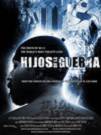One Gang, 100,000 Members
by

Alexandre Fuchs’ disturbing documentary, Hijos de la guerra --Children of the War -- offers a provocative exploration of Mara Salvatrucha, one of the world’s most violent gangs. How did this gang, formed in Los Angeles back in the late 1980s, develop into such a powerful force with so many members across the United States and Central America?
To answer this question, Fuchs’ award-winning film, written by Jeff Zimbalist, includes numerous revealing interviews with gang members and founders as well as with interested academics and other experts. It also features extensive footage inside jails. The result is a chilling picture of violence begetting violence.
Orphaned and abandoned children suffered greatly from the genocidal violence of the civil war in El Salvador, and many of them came to the United States after that war. Mara Salvatrucha, a.k.a. MS-13, was created by some of the El Salvadoran refugees in Los Angeles as a protection against other street gangs. Also, as with most gangs, it gave members a feeling of belonging and fulfilled needs their families weren’t able to meet.
Ironically, the frequent incarceration of MS-13 members helped the gang to grow in numbers and influence. It also taught them how to be more violent. Those gang members who returned to El Salvador were blamed for everything bad happening in that country. Mara Salvatrucha became the scapegoat, an easy target for politicians who wanted a simple solution to society’s problems. Putting the gang members in jail again increased the potential for more violence. Adding to the problem were vulnerable dependents left to fend for themselves.
Hijos de la guerra reminds me of Brazil’s Oscar-winning City of God. Both films are similar in their depiction of gangs and the horrific brutality displayed, but Hijos de la guerra terrified me the most because the violence in this riveting documentary is real. Neither movie should be viewed by the squeamish. However, for anyone who wants to see an in-depth analysis of the MS-13 phenomenon, Alexandre Fuchs’ important movie -- which recently earned “Best Documentary” at the New York Latino Film Fest and the Brooklyn International Film Festival -- is a must-see. (Capsule review)
(Released by Fly Films; not rated by MPAA.)





